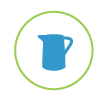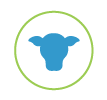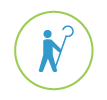Rural Technology for Smallholder Dairy Farms

Smallholder farmers depend on healthy herds of animals to produce quality, nutritious milk that can be sold in local markets as raw milk or milk products.

When an animal becomes sick, it can negatively impact milk quality and volume and a farmer's ability to generate a sustainable income.

Rural Tech is training program that will provide education in animal health, food safety, and farm management strategies to improve milk production and enhance the economic well-being of the village or individual farmer.
Globally, livestock and dairy industries contribute to the livelihood of at least 70% of the world's rural poor.1 Smallholder dairy farms typically only have a few head of animals including cows, small ruminants, water buffalo, and camels, however they farms represent an important source of sustenance and income for people in developing countries.2 Smallholder farming provides self-employment opportunities, especially for women, and provides nutrition and food security to create happier, healthier families.
The projected demands for milk and dairy products in China, Southeast Asia, Africa, and Latin America are dramatic and are expected to remain strong for the next several decades.3,4 Farmers across the globe have the opportunity to take advantage of this expansion to raise their standard of living. However, smallholder farming requires attention to public health in milk production and consumption, especially with regards to transmission of milk born diseases like tuberculosis and brucellosis. Due to lack of education, often times farmers are unaware of this risk.5 Additionally, other factors like extreme poverty and access to markets will prevent many of them from to meet this growing demand.
We have developed a training program in dairy management to improve outcomes for smallholders. Our program, Rural Tech, is a collection of animal management techniques ranging in sophistication from simple hand washing techniques to vaccinating dairy animals on a regular basis. By training farmers to use these practices and technologies, we can significantly improve the quality and volume of milk production in addition to their economic potential in rural value chains. By "training the trainers," we hope to help create a sustainable knowledge base to ensure long-term health benefits for smallholders. We also work with farmers from the beginning to define the best animal management strategies that are both practical and culturally appropriate for each farmer's unique situation. This ensures long-term adoption of these techniques along with long-term health benefits for the animals.
We also intend to explore the possibility of helping set up farming cooperatives. The potential advantages from this scenario include:
- Processors collect milk from a reliable and centralized location.
- Higher quality milk is harvested under industrial standards for quality control.
- Continuing education will foster acceptance of best dairy management practices.
- Animal waste can be efficiently harvested and processed for use as energy and fertilizer from a centralized operation center.
Current Project (Pilot Stage): Rwanda
Rwanda has a population of over ten million people and is the most densely populated country in Africa.6 Its livestock industry is an emerging enterprise with the potential for continued growth in the coming years. Milk spoiling and low quality milk are of special concern to developing countries like Rwanda, where cold chains are unreliable and breaks in the chain allow the bacterial load quickly to reach unsafe levels. The resulting decrease in milk supply negatively impacts each player along the dairy chain who rely on milk production.
Our goal is to promote sustainable health and longevity of the micro-dairy industry in Rwanda. We aim to achieve this through knowledge building and developing best practices strategies adapted to the local culture, economy, and environment. Our training programs will provide training in animal health and well-being, public health, ecosystem health, food safety and management strategies to enhance the economic well-being of the village or individual farmer.
Our activities will include:
- Identifying and targeting inefficiencies and barriers to quality in the value chain.
- Developing customized on-the-ground training programs to improve milk quality, disease control, and on-farm food safety.
- Sustaining our efforts by developing extension programs using distance learning technology.

